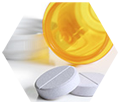
Medications That May Affect Your Triglyceride Levels

Some blood pressure medications can raise both triglyceride and LDL (bad) cholesterol levels. One example of this is hydrochlorothiazide, which is a kind of medication called a diuretic and commonly prescribed for high blood pressure.
If your dosage is 50 milligrams or more this can increase your LDL and triglycerides. The good news is that the increase often returns to normal after one year. The bad news of course is that it takes a year before blood pressure stabilizes. That said, its impact on triglycerides is small and dosages under 50 mg normally don't raise these number.
Other medications such as propranolol (Inderal, Innopran XL), atenolol (Tenormin) and metoprolol (Lopressor, Toprol-XL) are beta blockers and can also slightly increase triglycerides. But instead of raising the bad cholesterol like the diuretics, they lower the good (HDL) cholesterol.
This normally happens with patients who have metabolic syndrome, which includes:
- High blood pressure
- High blood sugar
- Excess weight around the abdomen
- Abnormal cholesterol and triglycerides
However, there are newer beta newer beta blockers (carvedilol (Coreg)) and nebivolol (Bystolic) that are less likely to create this metabolic change.
As with any medications, please consult your doctor about making changes to your diet and exercise routine. Don’t stop taking any prescribed medications without first talking to your doctor.